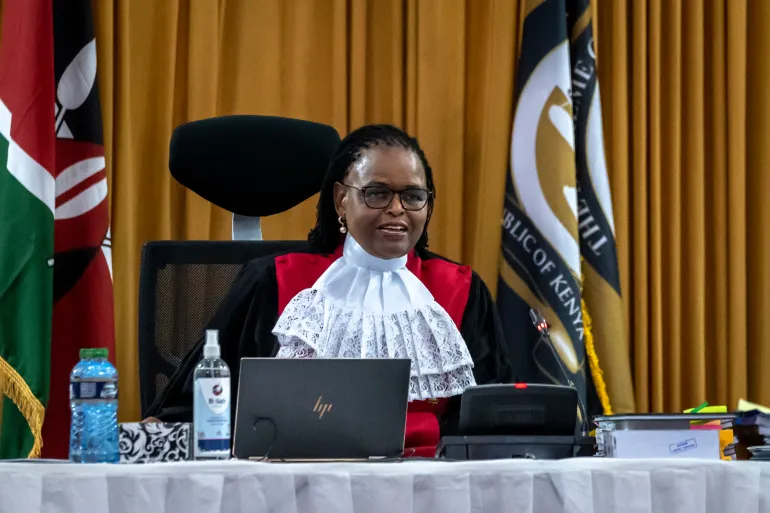
In a dramatic clash of powers, Kenyan President William Ruto has openly defied the judiciary, vowing to disregard court rulings that block his administration’s policies and accusing judges of political bias and corruption. What began as a disagreement over specific policies has now erupted into a wider debate about the roles of Kenya’s executive and judiciary, casting a shadow over the nation’s democratic future. The president’s claims that certain judicial decisions have obstructed government initiatives intended to uplift Kenyans are at the core of this dispute. This clash raises critical questions about the separation of powers, judicial independence, and the health of Kenya’s governance institutions.
President Ruto’s Allegations Against the Judiciary
President Ruto has publicly accused parts of the judiciary of obstructing his administration’s agenda, focusing on high-impact projects like affordable housing, healthcare, and economic reforms. He contends that some judges are aligned with opposition figures aiming to stall or derail his development projects. His words were as direct as they were fiery: “It is not possible that we respect the judiciary while a few individuals who are beneficiaries of corruption are using corrupt judicial officials to block our development projects.” To the president, these judicial blocks are not mere inconveniences but direct affronts to his vision of transforming Kenya’s economy.
This denunciation followed several key government policies meeting judicial resistance. Among these was a proposed housing levy, which the High Court recently deemed unconstitutional, citing discrimination against specific workforce groups. The levy, a cornerstone of Ruto’s urban development plans, aims to address Kenya’s housing shortage. However, critics argue that the policy places an undue burden on low-income earners. The ruling frustrated Ruto, who viewed it as yet another instance where the judiciary hindered the executive’s ability to implement critical reforms.
Judiciary’s Response: A Stand for Independence
Chief Justice Martha Koome swiftly responded to the president’s accusations, emphasizing the judiciary’s constitutional duty to remain impartial and uphold the rule of law. She warned that failure to respect court decisions could drive Kenya toward a perilous path. “When state or public officials openly disregard court orders, it not only undermines the principles of the Constitution but also establishes a dangerous precedent,” Koome stated, addressing both the judiciary and the public. Her words aimed to reaffirm the judiciary’s commitment to independence and impartiality.
The Judicial Service Commission (JSC) echoed this sentiment, stressing that any allegations of judicial misconduct must be supported by evidence and addressed through formal, legal channels. The JSC has consistently championed judicial independence, and this latest clash has prompted the commission to remind Kenyans that the judiciary functions as a vital check on government power.
Reactions from Civil Society and the Legal Community
The president’s statements have drawn mixed reactions from civil society groups, legal experts, and the broader public. The Law Society of Kenya (LSK) expressed deep concerns, with LSK President Eric Theuri describing Ruto’s rhetoric as “a troubling encroachment on judicial independence.” He warned that if the presidency continues to undermine the judiciary, Kenya risks setting a dangerous precedent that could weaken its democratic framework over time.
Prominent opposition figures, including Raila Odinga, have condemned Ruto’s approach, accusing him of attempting to intimidate the judiciary for political gain. Odinga argued that the executive must honor the separation of powers outlined in the Constitution, cautioning that failure would erode public trust in governance. Odinga’s stance resonates with many Kenyans who see this escalating tension as reflective of a broader drift toward authoritarianism within Ruto’s administration.
A Battle of Wills
This is not Kenya’s first executive-judiciary confrontation. In 2017, the Supreme Court annulled the presidential election results, citing irregularities. This landmark decision led to a standoff between the judiciary and then-President Uhuru Kenyatta, who publicly pledged to “revisit” the judiciary upon re-election. This event underscored the judiciary’s role as a defender of electoral integrity but also spotlighted the ongoing struggle to uphold a clear boundary between government branches.
Kenya’s experience is not unique. Throughout Africa, similar executive-judiciary tensions have tested democratic resilience. Former President John Magufuli’s administration clashed with the judiciary over human rights and media freedoms in Tanzania. Rwanda, Uganda, and other East African states have seen instances where judicial decisions conflicted with executive aims, often to the detriment of judicial independence. Observers note that Kenya’s current impasse mirrors these regional challenges, underscoring the difficulty of balancing executive power with judicial autonomy in emerging democracies.
Implications for Kenya’s Democratic Health
Kenya’s democratic stability relies on a clear separation of powers among its branches of government. Judicial independence is not merely a safeguard against executive overreach; it is a right of all Kenyans, who depend on the courts to protect civil liberties and ensure government accountability. Maintaining public trust in the judiciary is essential. When citizens feel the judiciary is under siege, confidence in the legal system—and ultimately in democratic governance—suffers.
Recent protests against the Ruto administration’s economic policies offer a stark reminder. Violent clashes between protesters and security forces, resulting in injuries and fatalities, reflect the consequences of eroding public trust. In these demonstrations, the judiciary’s role has been crucial, as Kenyans turn to the courts to assess the legality of government actions that impact their livelihoods. If the public begins to doubt the judiciary’s independence, Kenya risks entering a period of heightened tension and civil disobedience.
Moving Forward: A Path to Resolution
Resolving this impasse requires Kenya’s government branches to adhere closely to constitutional principles. The executive should respect judicial decisions, even when they challenge government policies, and seek reforms through established legal frameworks instead of public rebuke. The Ruto administration must demonstrate a commitment to the rule of law, not just as an ideal but as a practical reality that protects all citizens.
The judiciary, for its part, must continue prioritizing transparency, fairness, and adherence to legal standards. Clear communication about judicial rulings can prevent misinformation and help the public understand the legal basis for decisions. As Chief Justice Koome noted, respecting court orders is fundamental to upholding democratic values and social order. Transparent rulings can strengthen public trust, enhancing the judiciary’s role as a respected pillar of justice.
The Role of Civil Society and Public Accountability
Kenyan civil society organizations, including human rights groups and media outlets, play an essential role in this debate. Civil society can act as a stabilizing force amid political tensions by advocating for adherence to the rule of law and offering citizens a platform for expression. An independent media, too, is crucial in informing the public, holding leaders accountable, and facilitating informed discussions on governance.
Kenya’s citizens are vital in shaping their country’s democratic future. Through peaceful activism, engagement in public discourse, and active participation in elections, Kenyans can express their expectations for transparent, accountable governance. As the ultimate stewards of democracy, citizens must demand that all elected or appointed leaders honor the Constitution.
A Defining Moment for Kenya’s Democracy
The escalating clash between President Ruto and the judiciary is more than a political confrontation; it is a litmus test for Kenya’s commitment to democratic principles. This standoff is a powerful reminder of the delicate balance required to sustain Kenya’s democratic structure. The actions taken by the executive, judiciary, and civil society in the coming months will shape the future of Kenya’s governance and set critical precedents for generations to come.
In a country that has long been a beacon of democracy in East Africa, the world is watching. Whether this moment results in unity or further division, one thing is clear: Kenya’s dedication to the rule of law and separation of powers will ultimately determine the strength of its democracy in the years ahead.
